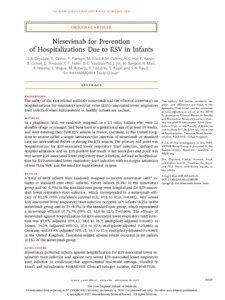Drysdale, SB;
Cathie, K;
Flamein, F;
Knuf, M;
Collins, AM;
Hill, HC;
Kaiser, F;
Cohen, R;
Pinquier, D;
Felter, CT;
et al.
Drysdale, SB; Cathie, K; Flamein, F; Knuf, M; Collins, AM; Hill, HC; Kaiser, F; Cohen, R; Pinquier, D; Felter, CT; Vassilouthis, NC; Jin, J; Bangert, M; Mari, K; Nteene, R; Wague, S; Roberts, M; Tissières, P; Royal, S; Faust, SN; HARMONIE Study Group
(2023)
Nirsevimab for Prevention of Hospitalizations Due to RSV in Infants.
N Engl J Med, 389 (26).
pp. 2425-2435.
ISSN 1533-4406
https://doi.org/10.1056/NEJMoa2309189
SGUL Authors: Drysdale, Simon Bruce
![[img]](https://openaccess.sgul.ac.uk/115949/1.hassmallThumbnailVersion/nejmoa2309189.pdf)  Preview |
|
PDF
Published Version
Available under License ["licenses_description_publisher" not defined].
Download (694kB)
| Preview
|
Abstract
BACKGROUND: The safety of the monoclonal antibody nirsevimab and the effect of nirsevimab on hospitalizations for respiratory syncytial virus (RSV)-associated lower respiratory tract infection when administered in healthy infants are unclear. METHODS: In a pragmatic trial, we randomly assigned, in a 1:1 ratio, infants who were 12 months of age or younger, had been born at a gestational age of at least 29 weeks, and were entering their first RSV season in France, Germany, or the United Kingdom to receive either a single intramuscular injection of nirsevimab or standard care (no intervention) before or during the RSV season. The primary end point was hospitalization for RSV-associated lower respiratory tract infection, defined as hospital admission and an RSV-positive test result. A key secondary end point was very severe RSV-associated lower respiratory tract infection, defined as hospitalization for RSV-associated lower respiratory tract infection with an oxygen saturation of less than 90% and the need for supplemental oxygen. RESULTS: A total of 8058 infants were randomly assigned to receive nirsevimab (4037 infants) or standard care (4021 infants). Eleven infants (0.3%) in the nirsevimab group and 60 (1.5%) in the standard-care group were hospitalized for RSV-associated lower respiratory tract infection, which corresponded to a nirsevimab efficacy of 83.2% (95% confidence interval [CI], 67.8 to 92.0; P<0.001). Very severe RSV-associated lower respiratory tract infection occurred in 5 infants (0.1%) in the nirsevimab group and in 19 (0.5%) in the standard-care group, which represented a nirsevimab efficacy of 75.7% (95% CI, 32.8 to 92.9; P = 0.004). The efficacy of nirsevimab against hospitalization for RSV-associated lower respiratory tract infection was 89.6% (adjusted 95% CI, 58.8 to 98.7; multiplicity-adjusted P<0.001) in France, 74.2% (adjusted 95% CI, 27.9 to 92.5; multiplicity-adjusted P = 0.006) in Germany, and 83.4% (adjusted 95% CI, 34.3 to 97.6; multiplicity-adjusted P = 0.003) in the United Kingdom. Treatment-related adverse events occurred in 86 infants (2.1%) in the nirsevimab group. CONCLUSIONS: Nirsevimab protected infants against hospitalization for RSV-associated lower respiratory tract infection and against very severe RSV-associated lower respiratory tract infection in conditions that approximated real-world settings. (Funded by Sanofi and AstraZeneca; HARMONIE ClinicalTrials.gov number, NCT05437510).
| Item Type: |
Article
|
| Additional Information: |
From New England Journal of Medicine, Drysdale, SB; Cathie, K; Flamein, F; Knuf, M; Collins, AM; Hill, HC; Kaiser, F; Cohen, R; Pinquier, D; Felter, CT; et al., Nirsevimab for Prevention of Hospitalizations Due to RSV in Infants, Volume No. 389, Page No. 2425-2435 Copyright © 2023 Massachusetts Medical Society. Reprinted with permission. |
| Keywords: |
Infant, Humans, Antibodies, Monoclonal, Humanized, Respiratory Syncytial Virus, Human, Hospitalization, Respiratory Syncytial Virus Infections, Respiratory Tract Infections, HARMONIE Study Group, 11 Medical and Health Sciences, General & Internal Medicine |
| SGUL Research Institute / Research Centre: |
Academic Structure > Infection and Immunity Research Institute (INII) |
| Journal or Publication Title: |
N Engl J Med |
| ISSN: |
1533-4406 |
| Language: |
eng |
| Publisher License: |
Publisher's own licence |
| Projects: |
| Project ID | Funder | Funder ID |
|---|
| N/A | Sanofi | UNSPECIFIED | | N/A | AstraZeneca | UNSPECIFIED |
|
| PubMed ID: |
38157500 |
| Dates: |
| Date |
Event |
| 2023-12-28 |
Published |
| 2023-11-03 |
Accepted |
|
 |
Go to PubMed abstract |
| URI: |
https://openaccess.sgul.ac.uk/id/eprint/115949 |
| Publisher's version: |
https://doi.org/10.1056/NEJMoa2309189 |
Statistics
Item downloaded times since 04 Jan 2024.
Actions (login required)
 |
Edit Item |



